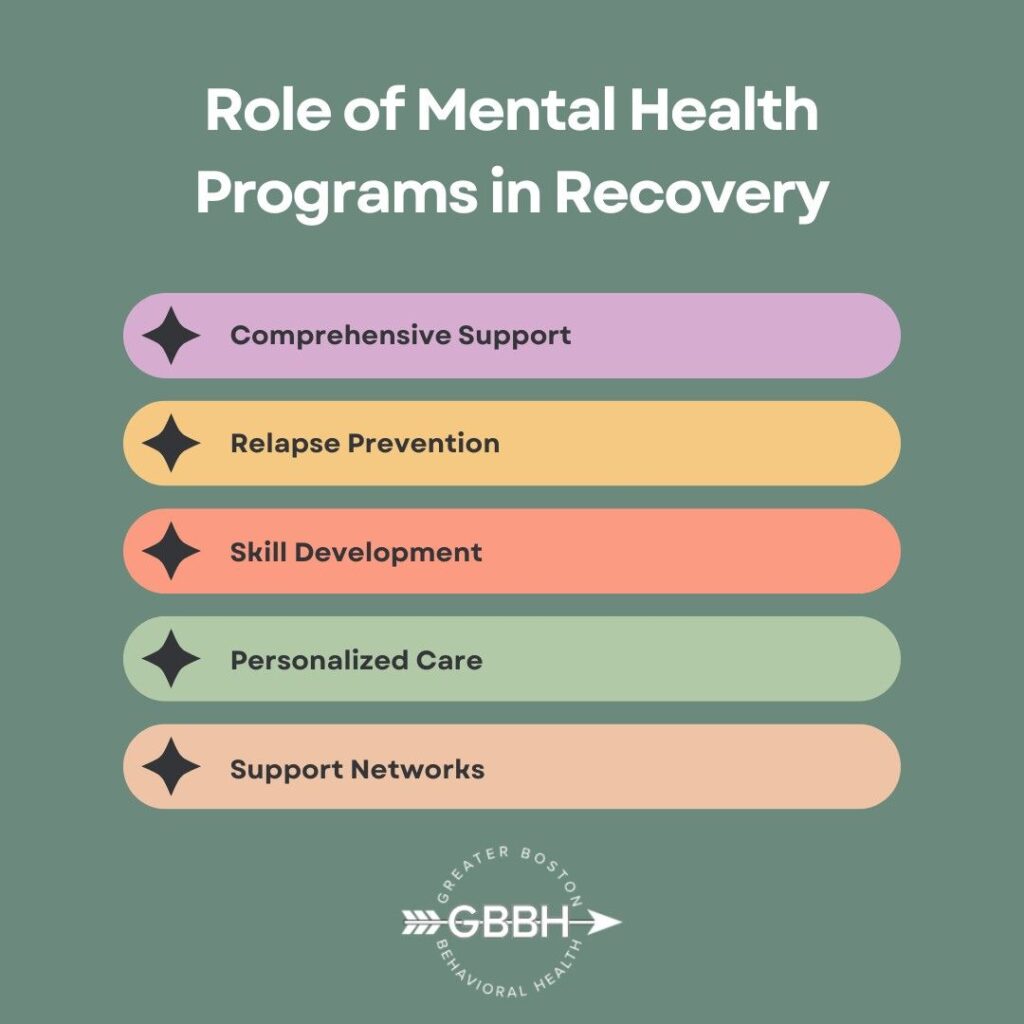Recovery from addiction and mental health challenges is a journey, not a destination. This is where aftercare programs play a pivotal role, offering the necessary tools and support systems to ensure individuals maintain their recovery over the long haul. In this article, we explore why aftercare programs are crucial for sustained recovery success, particularly focusing on the benefits of mental health programs and addiction aftercare programs.
The Role of Mental Health Programs in Recovery
Mental health programs are integral to the recovery process, providing individuals with the necessary resources to address underlying issues that contribute to addiction or mental health disorders. These programs, offered by specialized mental health treatment centers, are designed to provide a safe and supportive environment where individuals can work through their challenges with the help of professionals. Numerous mental health treatment centers in Massachusetts provide these essential services, ensuring that individuals receive comprehensive care tailored to their specific needs.
1. Prevention of Relapse
Relapse is a common challenge during recovery, with statistics showing that nearly 40-60% of individuals relapse at least once. Aftercare programs offer structured support to help prevent relapse by providing coping strategies, ongoing counseling, and peer support groups. These programs allow individuals to address the stressors, triggers, and emotional challenges that can lead to relapse, offering tools to maintain sobriety in the face of temptation.
2. Ongoing Therapy and Counseling
After completing an initial treatment program, individuals benefit greatly from continued therapy. Aftercare programs often offer individual therapy, group therapy, or family counseling. This ongoing emotional support helps people continue working through underlying issues such as trauma, mental health conditions, or relationship challenges, which can otherwise hinder long-term recovery.
3. Accountability and Structure
One of the main benefits of aftercare programs is the accountability they provide. Regular check-ins with counselors, participation in support groups, and milestones in the recovery process keep individuals focused and committed to their sobriety goals. The structure helps bridge the gap between inpatient treatment and returning to everyday life, ensuring that individuals don’t feel overwhelmed by the transition.
4. Building a Strong Support Network
Aftercare programs encourage individuals to build and maintain a strong support network, which is crucial for recovery. Programs like Alcoholics Anonymous (AA) or Narcotics Anonymous (NA) offer peer support and foster a sense of community. These support networks allow individuals to connect with others who understand their experiences and challenges, helping them stay motivated on their recovery journey.
5. Focus on Life Skills and Reintegration
Recovery is about more than just abstaining from substances; it’s also about reintegrating into society as a healthy, functional individual. Aftercare programs often focus on life skills such as job training, financial management, and communication skills. These programs help individuals rebuild their lives and find purpose in sobriety, reducing the likelihood of relapse.
6. Holistic Healing and Wellness
Many aftercare programs incorporate holistic approaches to healing, such as mindfulness practices, yoga, or fitness programs. These activities not only promote mental and physical wellness but also offer alternative ways to cope with stress.
The Importance of Addiction Aftercare Programs
Addiction aftercare programs are specifically designed to support individuals after they have completed an initial treatment program. While the primary treatment phase may involve detoxification, intensive therapy, and the development of coping strategies, aftercare programs focus on sustaining the progress made during this time. Without a structured aftercare program, individuals are at a higher risk of relapse, as they may not have the ongoing support necessary to navigate the challenges of everyday life post-treatment.
Aftercare programs typically include a combination of continued therapy, support groups, and monitoring, which helps individuals stay on track with their recovery goals. These programs are particularly effective when they are customized to meet the unique needs of each individual, addressing specific triggers and providing strategies to cope with potential setbacks.
Aftercare Programs for Mental Health: A Lifeline for Sustained Wellness
Aftercare programs are not limited to addiction recovery; they are equally crucial for individuals dealing with mental health disorders. An aftercare program for mental health focuses on maintaining the stability achieved during initial treatment and preventing relapse into a crisis. These programs often include ongoing counseling, medication management, and participation in support groups.
This ensures that individuals remain connected with their treatment providers and have access to the resources they need to manage their mental health effectively. In Massachusetts, mental health treatment centers offer a variety of aftercare options, including outpatient services and intensive outpatient programs (IOPs), which provide structured support.
Intensive Outpatient Programs
One of the most effective forms of aftercare is the Intensive Outpatient Program (IOP). These programs are designed for individuals who do not require 24/7 supervision but still need a structured and supportive environment to maintain their recovery.
IOPs typically involve multiple therapy sessions each week, incorporating different therapeutic modalities such as cognitive-behavioral therapy (CBT). CBT is a cornerstone of many mental health therapy programs and is particularly effective in helping individuals change negative thought patterns and behaviors that contribute to their mental health challenges or addiction.
Cognitive-Behavioral Therapy: A Foundation for Long-Term Recovery
Cognitive-behavioral therapy (CBT) is a critical component of aftercare programs, especially for those dealing with addiction or mental health disorders. CBT focuses on identifying and changing negative thought patterns that can lead to self-destructive behaviors.
The Value of Mental Health Therapy Programs in Aftercare
Mental health therapy programs are an essential part of the aftercare process, offering ongoing support and treatment to individuals as they navigate life post-recovery. These programs are designed to address the unique challenges that arise after initial treatment, providing a safety net for individuals who may still be vulnerable to relapse.
Therapy programs can include a range of modalities, from individual counseling to group therapy and family therapy. Each of these approaches offers a different type of support, helping individuals strengthen their relationships, improve communication skills, and build a robust support network.
Conclusion: Aftercare as a Key to Sustained Recovery
In conclusion, aftercare programs are an indispensable element of long-term recovery from addiction and mental health disorders. By providing ongoing support, structured guidance, and access to essential resources, these programs help individuals maintain the progress they have made and build a stable, fulfilling life in recovery. Whether through mental health programs, addiction aftercare programs, or intensive outpatient programs, the path to sustained wellness is made clearer and more achievable with the right aftercare support. Call us today at (888)278-0716 to begin healing today.
FAQ on Why Aftercare Programs Are Essential for Long-Term Recovery
Why are aftercare programs important for long-term recovery?
Aftercare programs provide essential support in preventing relapse, ensuring ongoing therapy, and offering accountability. They help individuals develop coping strategies, build support networks, and reintegrate into society with necessary life skills, which are crucial for sustaining long-term recovery.
How do aftercare programs prevent relapse?
Aftercare programs prevent relapse by offering regular therapy sessions, peer support groups, and access to counselors. These resources help individuals address triggers, manage stress, and stay committed to their sobriety goals, reducing the likelihood of relapse.
What types of therapy are included in aftercare programs?
Aftercare programs may include individual therapy, group therapy, and family counseling. These ongoing therapeutic sessions help individuals work through emotional challenges, mental health issues, and unresolved trauma that could hinder their recovery.
Are aftercare programs only for those in early recovery?
No, aftercare programs are beneficial at any stage of recovery. Whether someone is newly sober or has been in recovery for years, aftercare programs offer continued support and resources to help individuals stay on track and maintain a healthy, sober lifestyle.


